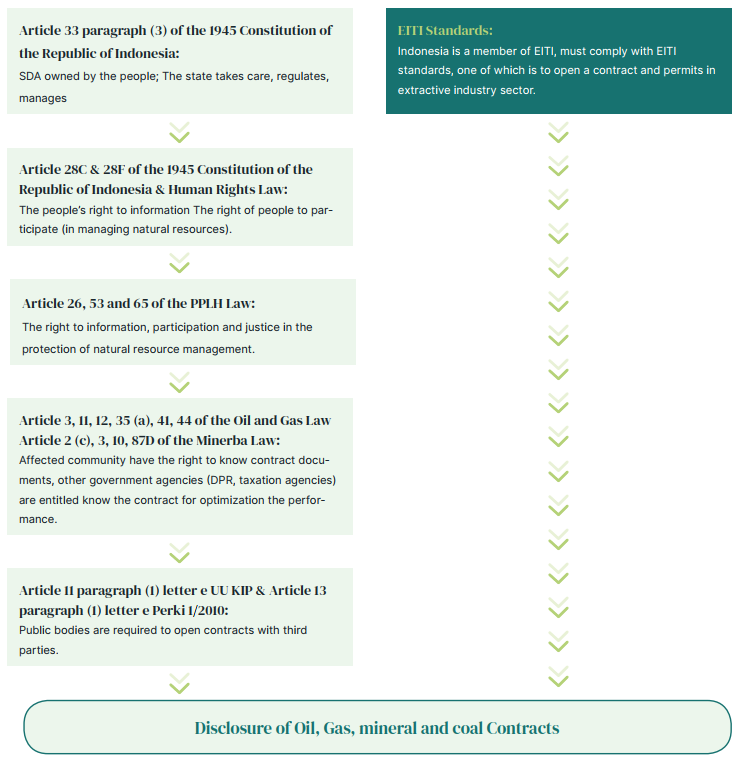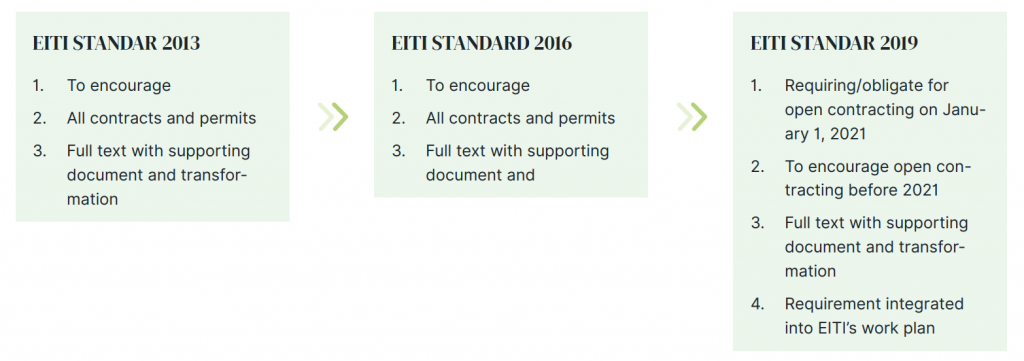Open contracts and permits still debate. Some people argue that contracts and permits should be opened to the public or vice versa.
Open contract in extractive industry sector has been widely voiced in various global initiatives such as Extractive Industry Transparency Initiative (EITI) and Open Government Partnership (OGP), and Indonesia is being a member in that initiatives.
Besides that, Law Number 14 of 2009 on Public Information Disclosure clearly said that the implementation of that is conducted by the public bodies from local and national. But, the mandate from that law is not going optimal.
Public Information Disclosure Law explicitly said that contract and permit documents are open information. But, on a practical level, the public still hard to see the contract and permit documents.
Hence, public information disclosure policy in the mining sector is important to be encouraged. Besides increasing transparency and improving extractive governance, also increasing public trust to state on manage natural resources. Transparency and accountability are one of ‘social license to operate’ standards for economic activity, include natural resources sector industry.
Publish What You Pay (PWYP) Indonesia, as civil coalition who concerns guarding EITI standard to encourage transparency and accountability at the extractive industry, had been arranged several topics for open contract and permit studies such legal/regulation framework, open contracting include EITI Global initiative, beneficial ownership, an empirical study on information access in the local level.
On Wednesday, June 30, 2020. PWYP Indonesia arranges public discussion with the title “Open Contracting and Permit in Indonesia: Legal Framework, EITI Implementation, Beneficial Ownership, Open contracting practice in the local area”. The purpose of the discussion is to disseminate research and getting public input at once providing their awareness of the essentials of open contracting for public rights on natural resources management.
Researchers attended the discussion and became speaker to show their research results. The speakers were Dessy Eko Prayitno, Giri Ahmad Taufik, Choky Ramadhan, and Triono Hadi, at the same time the moderator is Meliana Lumbantoruan and the panelists are M. Syahyan from Central Information Commission and Maryati Abdullah from PWYP Indonesia.
Legal Framework of Open Contracting in Indonesia
Article 33 section (3) of the 1945 constitution of the republic Indonesia explicitly said that all the natural resources are controlled by the state and used to public prosperity. Extractive industries such as oil & gas, and mineral and coal mining have high risk, high technology, and high cost so that the industry needs investor collaboration who has big capital and competitive technology. One of collaboration form is a contract system Dessy Eko Prayitno said that “Government confused to open contract document because it could not understand clearly about open contract legal framework in Indonesia, also the doubt to fulfill public or investor interest”.
Open Contracting on natural resource management in Indonesia could be seen in these perspectives: First, as government responsibility to do the mandate on managing the country’s natural resources. Second, creating room for participation public to manage the natural resource as in 1945 constitution of republic Indonesia article 33 section 3. Third to implement Public Information Disclosure Law Fourth to implement Law Number 30 of 2014 on Government Administration, especially human rights, the principle of good governance Law Number 30/2014 especially on the principles of benefit, impartiality, rigor, disclosure, and the principle of public interest.
Dessy Eko also said that “Open contracting on natural resources in Indonesia is a form of government responsibility on 1945 constitution of republic Indonesia on article 33 section 3, related to Human Rights Law, environmental protection and management (PPLH)”. She said.

Open Contracting and EITI Standard
As it is explained before, Indonesia commits to international to open contracting. Its commitment is related to Indonesia as a member of EITI which is a global initiative on transparency at the extractive sector. Even though open contracting has been started since 2013, at first it is only a form of suggestion. But, in the 2019 EITI Standard, open contracting is required for all of the member countries include Indonesia.

In requirement 2.4, 2019 EITI Standard, open contracting requirement for member countries is agreed to apply on January 1, 2021. But, members are suggested to open and publish contract that has been existed before 2021” Triono Hadi said in that discussion. Coordinator of Fitra Riau also said that “Beside legal framework for open contracting at the national level which is clear and regulated in the Law and its derivatives, the commitment of the Indonesian government as a member of the EITI can also be used as a strong legal framework for implementing open contracting in Indonesia”. He said.
Even though there are many opportunities to support the government to implement the 2019 EITI Standard on open contracting and transparency in public procurement but they are still facing many obstacles (Ministry of Energy and Mineral Resources) hence there are no contracts or permit that is accessible for the public.
Open Contracting and Beneficial Ownership Transparency
Open contracting and beneficial ownership transparency are two forms of transparency from companies. It is very important as steps to prevent corruption, money laundering, tax compliance, and other criminal acts. As an EITI member country that will implement open contracting standards and also as a FATF member who also applies the open beneficial ownership clause, Indonesia has an important role. Moreover, Indonesia already has a Presidential Regulation that mandates the implementation of these two initiatives.
Choky Ramadhan said that “Open contracting and beneficial ownership transparency are two initiatives that can be linked and will have a more meaningful impact on each other. Both of these initiatives aim to reduce the potential for corruption, especially in public procurement and permit.”
Choky also said that “The combination of initiative on open contracting and beneficial ownership transparency is beneficial to further increase transparency, supervision/public participation, the quality of the process, and results of public procurement. The implementation of both simultaneously can prevent the selection of corporations that have the potential to have conflicts of interest, monopolize, and /or manage illicit financial flows in public procurement”.
The result of the research said that there are at least 2 schemes for applying open contracting by linking to beneficial ownership transparency, that is to say:
First, transparency of company information, its data could be received from register data or portal as part of the steps to a company that interests to join the procurement. Participants could fill its identity and beneficial ownership so that company data could be linked and compared to its beneficial ownership information.
Second, the correlation between open contracting and beneficial ownership transparency by requiring companies that will participate in public procurement tenders to open their beneficial ownership. This aims to identify potential conflicts of interest, prevent collusion between related companies, create healthy competition between companies, and guarantee complete information related to the beneficial owner of state funds.
The government has to implement open contracting as a step to create good governance of natural resources. (M/L)